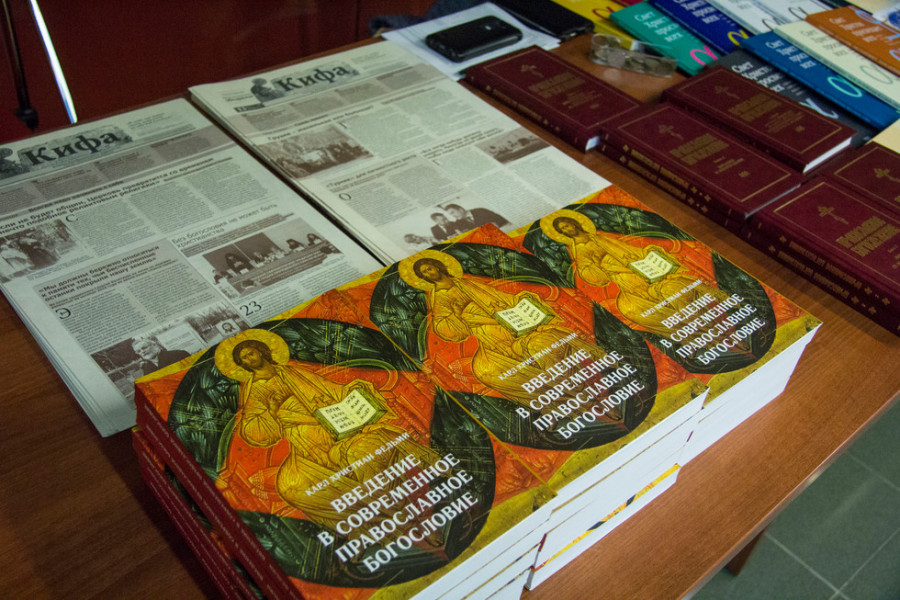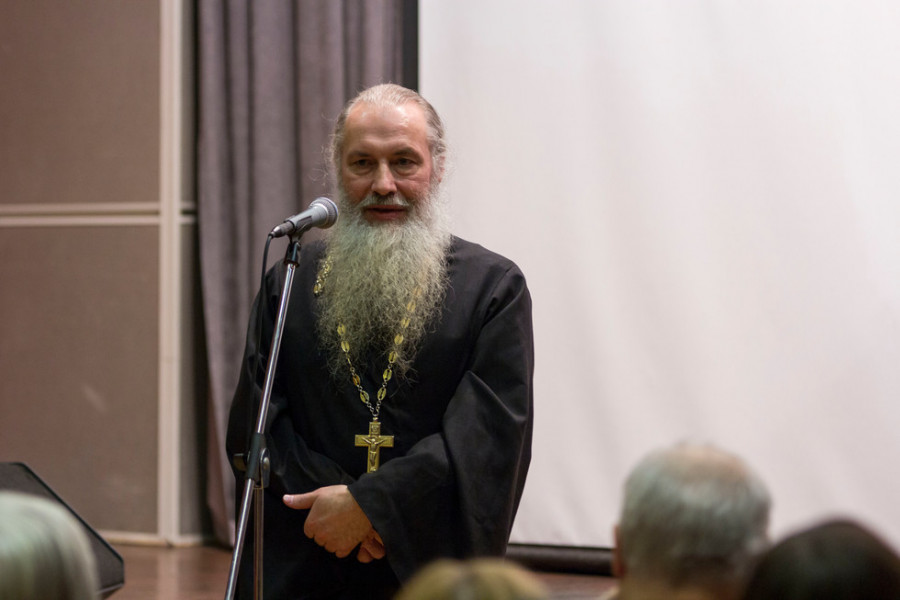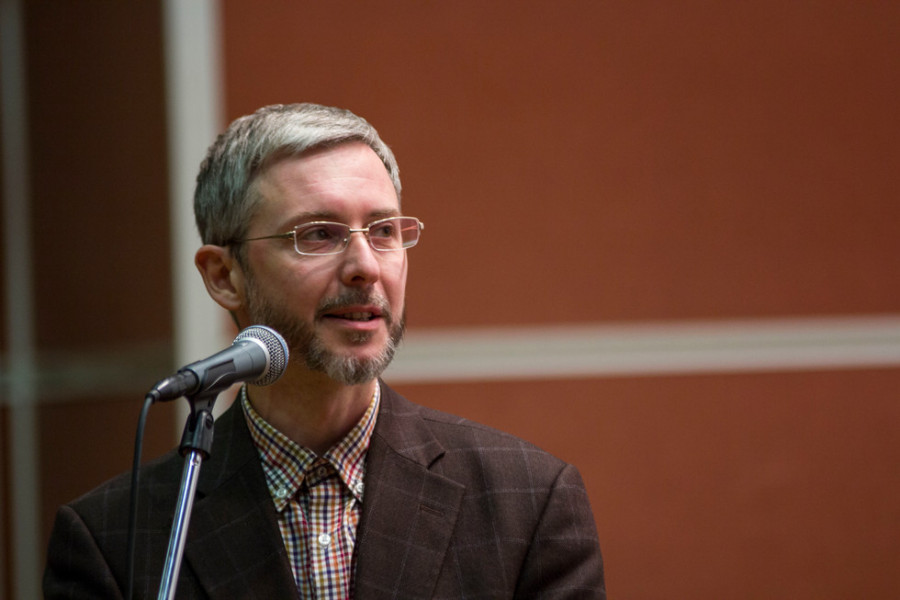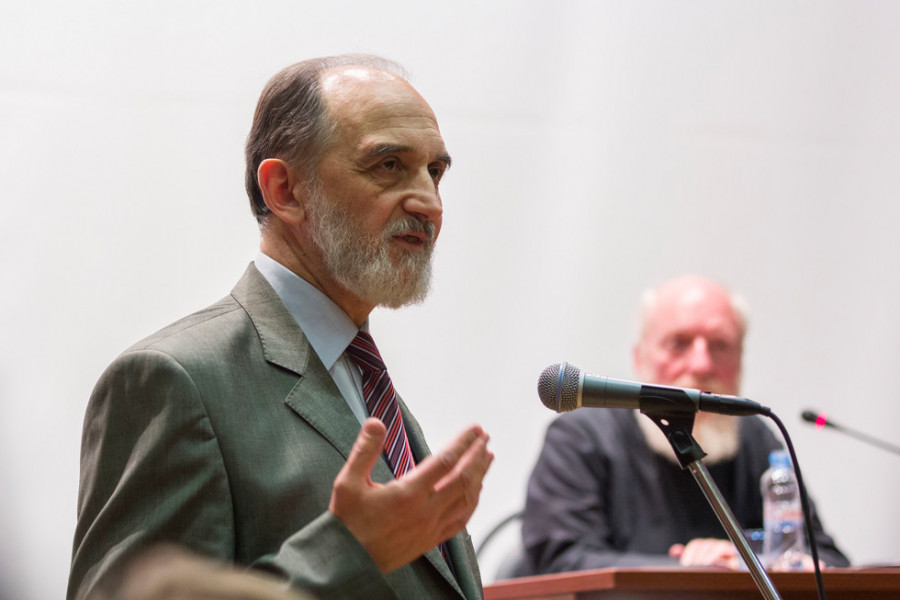A Treasury of Orthodox Questions

Deacon Vasily (Karl Christian) Felmy holds a Doctorate in Theology (Germany) and an honorary doctorate from the Moscow Theological Academy. He is a member of the SFI (St. Philaret’s Institute) Board of Trustees.
On December 1st, at the Alexander Solzhenitsyn Centre for the Study of the Russian Diaspora in Moscow, Deacon Vasily (Karl Christian) Felmy presented a second, corrected and augmented edition of his book, An Introduction to Contemporary Orthodox Theology (Einführung in die orthodoxe Theologie der Gegenwart). The event was a discussion about contemporary theology as well as a book launch.
Professor Karl Christian Felmy is a German theologian and author who has been widely translated and published in many countries. Felmy began work on An Introduction to Contemporary Orthodox Theology when he was a Lutheran pastor. During the process of writing, Felmy made his final decision to convert to Orthodoxy. Later, the work was translated into Greek, Bulgarian, Romanian, Polish, Spanish, Italian and Russian. The second Russian-language edition was released by St. Philaret’s Institute in 2014.
The book provides an introduction to central theological concepts and the history of their development and significance through the present day. It also explores the relationship between theology and the experience of Orthodox life and thought. The book will be interesting to both teachers and students of theology, as well as to a wider readership interested in Christian tradition and the legacy of the most prominent Orthodox theologians.

“During the 20th century, theological thought was not permitted to develop freely in our country,” said SFI Provost, Dmitry Gasak, who moderated the event. “Only after the celebration of the baptism of Ancient Rus (marking a millennium of Christianity in Russia), did an opportunity appear to study theological works from different ages, including those that came out of the Russian emigration during the 20th century. At this point it also became possible for theological thought – as an expression of people’s experience of knowing God – to freely develop within Russia’s educational institutions, so that everyone with faith and sincere desire could join in this vitally important experience. For us, working with Deacon Vasily on this book was a great honor; we are delighted that its second edition was published by our Institute.”

In introducing his book, Professor Felmy himself noted that the second edition represents a significant revision and contains a good amount of new material.
“The Institute undertook an enormous effort to revise the text, and I was excited about the opportunity to improve my book,” he said.
In presenting his paper, Topical Issues in Contemporary Orthodox Theology in the Context of Church Life, Professor Felmy outlined the major topics covered by Orthodox theologians, particularly in the 20th century. He discussed: worship and sacraments, the Orthodox doctrine of salvation – which is “still to an astounding extent underdeveloped”, attitudes to the historical-critical method of biblical exegesis, and the doctrine of the church – particularly Eucharistic ecclesiology – which poses new problems as well as solving old ones. Even the question of the place and significance of scholarly theology itself was a matter for discussion.

“Scholarly theology is not an ideal mode of expression for Orthodox theological thought,” said Professor Felmy. “True theology always expresses an experience.”
“‘An introduction to theology’, as far as this book is concerned, means an immersion in the depths of the tradition. Moreover, we discover that in these depths there are all manner of possible streams – some refreshing, and some that scare us with their intensity, because we ourselves do not always have the courage to think questions through to the end,” remarked Professor David Gzgzyan, Head of the Theology and Liturgical Studies Department at SFI and member of the Inter-Council Convocation of the Russian Orthodox Church. “The book returns us to fundamental Orthodox meaning and reminds us that the category of experience is extremely important for the Orthodox tradition.”

According to Professor Gzgzyan, the Orthodox tradition only benefits from the fact that through the author, it finds itself opened to all manner of creative intuition, including those which come from beyond the bounds of confessional Orthodoxy.
“Rereading this book I suddenly found myself in a mild state of shock, because I did not expect to hear from Martin Luther that the goal of the Christian life is union with Christ and theosis, or to learn, for example, that for those coming from within the Protestant tradition, chrismation might be perceived as the ordination of laity,” said Professor Gzgzyan.

According to Archpriest Alexander Troitsky, Chief Bibliographer of the Synodal Library, “the book is unique amongst those published in Russian, and generally within the body of Christian literature; it is well worth reading for anyone who is interested in contemporary theology.”
“Until now I have never come across a book in which the theological experience of recent years is сonsidered with reference to the insights of previous centuries and other Christian confessions, which have always, in one way or another, influenced Orthodox thought,” said Fr Alexander. “There is no other book in which Russian Orthodox theology is considered alongside Romanian and Greek Orthodox theology. This is a great help to us as we get to know those authors, whose works have not yet been fully translated.”
Fr Alexander added, “it is no surprise that this book came out of the German academic environment, but those who are proficient in both German and Russian should read it in Russian.”
“The index of names and the accuracy of quotations remove ambiguities which were present in the first Russian-language edition. With the bibliographic references in this edition of the book, the the publisher's attentions could be called ‘supereragatory’ – going well above and beyond the call of duty,” he also remarked.

“This book is for any Christian who is interested in Orthodox theology and the experience of uniting faith and prayer,” said Alexey Fokin, Head of the Theology Department at Ss Cyril and Methodius Theological Institute of Post-Graduate Studies.

“I like the way this book contains virtually nothing about icons but displays the icons themselves,” said Professor Alexander Kopirovsky, Lecturer in Introductory Theology and Religious Aesthetics. “The contemplation of icons is so often replaced with purely artistic-academic or theological texts, and we forget that the icon itself is theology in colour, and itself addresses the person directly. This book helps the reader to learn a language by virtue of which the icon becomes, for him, not merely a sign of Orthodoxy but acquires a voice of its own.”

“Perhaps the most remarkable thing about Professor Felmy’s book is that he associates Tradition not only or primarily with the past – that which has gone – or not gone – before. No, here Tradition is a step forward. That is why this book conveys so much joy and inspiration,” said Fr Georgy Kochetkov, Professor and Rector of SFI. “Tradition is something that is revealed and reveals new possibilities. Of course, Tradition is Tradition, it does not break with the past, but, at the same time, always has an eschatological vector. This aspect of Tradition is brought out very deeply, naturally and in a lively way in Professor Felmy’s book – and in its true simplicity, because of the logic of the presentation. And what can one say? Here the western school is a good example for us. The writing is clear, brief and distinct – while at the same time, the roots of the author’s inspiration are in living experience, which invites the reader in. Every time I opened the book it provided me with a breath of fresh air and living water.”

Fr Georgy also drew attention to the book’s catechetical aspect, which could help people today in their experience of church life and Christian life in general.
“This book could be instrumental in the revival of that layer of church Tradition, which could help today’s people, who are so distant from the church and her spirit and patterns of thought; it could help them to enter into the Tradition and to carry on further in their lives. I would recommend this work to every serious catechist who is capable of teaching Mystagogy to spiritually mature and seeking adults, and not only children’s catechesis. There are more and more seriously-seeking adults in our country as well as in the West. On the one hand, at present we see a general revulsion against Christianity, against the church, and everything traditional or relating to the past. On the other hand, there is a great thirst to progress and the revival of the experience of Mystagogy and guiding people into the fullness of sacramental life is a huge issue. The teaching of Mystagogy cannot be reduced to some sort of campaign against illiteracy, be it for children or for adults. May God grant us more books like this one!”
During the course of the meeting, spiritual unity among the Orthodox was also discussed. A postgraduate student from Ss Cyril and Methodius Theological Institute of Post-Graduate Studies, Alexey Makarov, observed that the church today “is changing from a community of people competent in complex theological issues into a group from where people are ready to partake in embittered disputes and split into several parts.” Responding to questions about the possible development of these disputes and particularly about the hope of reaching consensus within the framework of the upcoming Pan-Orthodox Council, Professor Felmy said that “one should not expect too much” from the Council because complete unanimity is a preliminary requirement. He noted, however, that the convocation of the Council, in and of itself, is significant. Professor Felmy agreed that participants in the theological disputes of the early 20th century were, as a rule, more knowledgeable in their subject matter by an order of magnitude – neither was the tone of disputes as embittered, but rather more ironic.
As noted by Professor Gzgzyan, the book suggests that it is not of primary importance for us to quickly attain consensus let alone to document that consensus. It is much more important for us to gain the experience of moving forward together – the experience of reaching consensus, losing it and finding it again, and of fine-tuning our theological thought based on our experience of the fullness of life.





